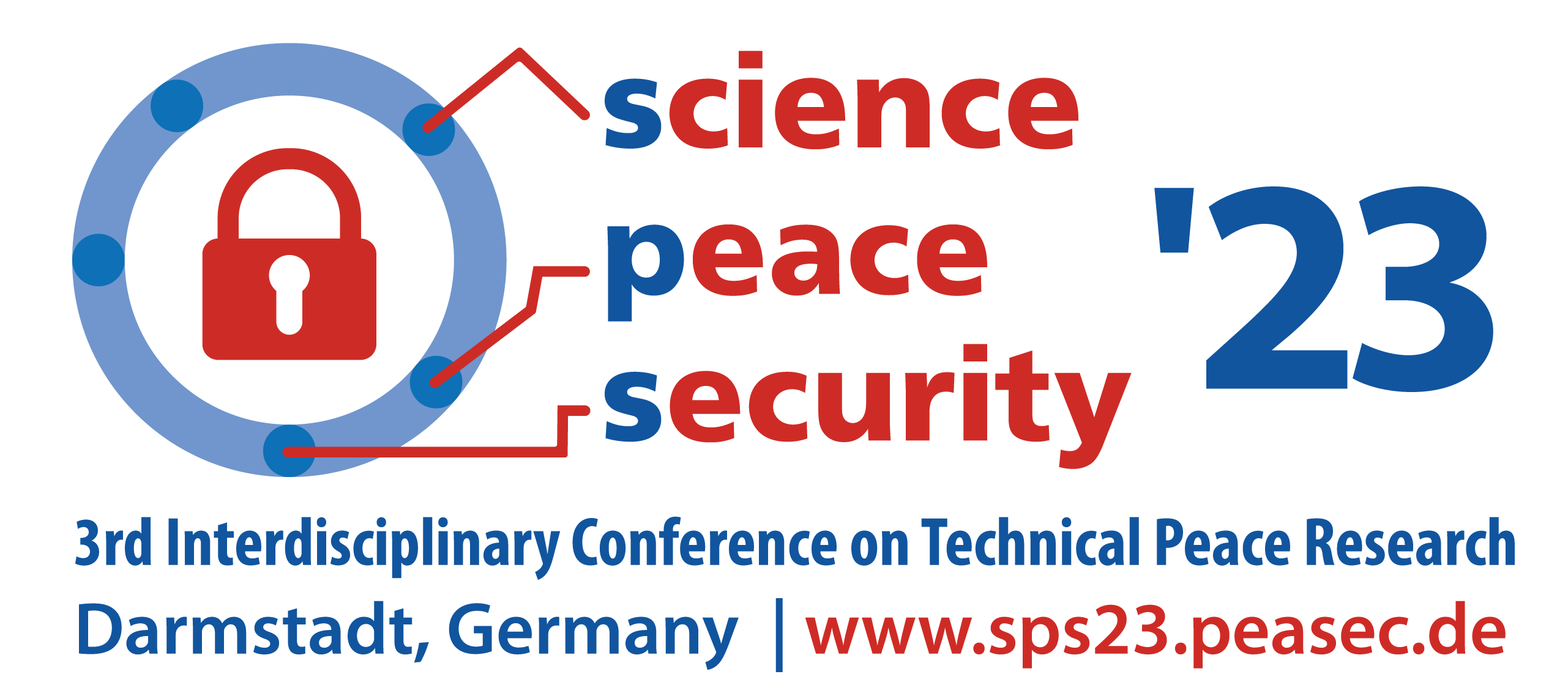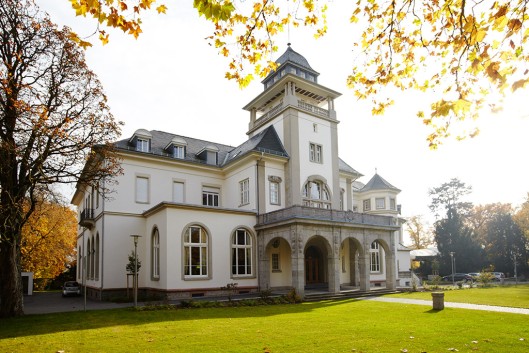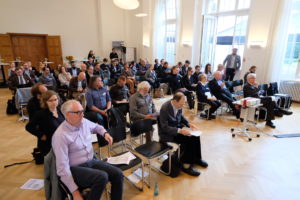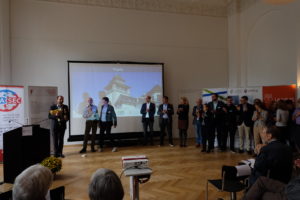Direct Links: Program'23, Proceedings'23

Science · Peace · Security ’23
Technology and the Transformation of Political Violence
Wednesday 20.- Friday 22. September 2023
Georg-Christoph-Lichtenberg-Haus, Dieburger Str. 241, 64287 Darmstadt, Germany

Lichtenberg-Haus

Group picture from Science Peace Security '19 in Darmstadt
Science · Peace · Security '23
Die Konferenz Science · Peace · Security ’23 findet vom 20. bis 22. September 2023 an der Technischen Universität Darmstadt statt. Sie widmet sich dem Wandel von Technologien, deren Rolle in Kriegen und Konflikten sowie Fragen der Rüstungskontrolle. Am 21. September lädt ein öffentliches Dialogpanel insbesondere zivilgesellschaftliche Organisationen ein, um den Austausch zwischen Forschung und Praxis zu fördern. Zu dieser Veranstaltung ist auch die breite Öffentlichkeit eingeladen. Ausgerichtet wird die englischsprachige Konferenz von TraCe, einem hessischen BMBF-Forschungsverbund zu Transformationen politischer Gewalt, vom DFG-Sonderforschungsbereich CROSSING und vom Forschungsverbund Naturwissenschaft, Abrüstung und internationale Sicherheit FONAS.
Technologische Transformationen in bewaffneten Kriegen und Konflikten
Zur dreitägigen wissenschaftlichen Konferenz werden rund 100 Teilnehmer:innen erwartet, um in etwa 40 Vorträgen, Workshops, Diskussionsrunden und Panels aktuelle und zukünftige Herausforderungen im Bereich der technischen Friedens- und Konfliktforschung zu diskutieren. Künstliche Intelligenz, unbemannte Waffensysteme, Raketen- und Raumfahrttechnologien, (nukleare) Rüstungskontrolle, Regulierung biologischer und chemischer Waffen, Informationstechnologien zur Überwachung und Unterdrückung von Zivilist:innen, (zivile) kritische Infrastrukturen, digitales Peacebuilding, Mensch-Maschine-Interaktion, Dual-Use und Cyber-Angriffe sowie entsprechende Technologie- und Sicherheitspolitik: Das Spektrum des Programms ist breit gefächert und spiegelt gesamtgesellschaftliche Diskurse im Lichte einer sich verändernden globalen Sicherheitslandschaft wider.
Science · Peace · Security '23
The conference Science - Peace - Security '23 will take place from September 20 to 22, 2023 at the Technical University of Darmstadt. It is dedicated to the transformation of technologies, their role in wars and conflicts, and questions of arms control. On September 21, a public dialogue panel will invite civil society organizations in particular to promote exchange between research and practice. The general public is also invited to this event. The English-language conference is organized by TraCe, a Hessian BMBF research network on transformations of political violence, by the DFG Collaborative Research Center CROSSING and by the research network Natural Science, Disarmament and International Security FONAS.
Technological transformations in armed wars and conflicts
Around 100 participants are expected to attend the three-day scientific conference to discuss current and future challenges in the field of technical peace and conflict research in around 40 lectures, workshops, discussion rounds and panels. Artificial intelligence, unmanned weapons systems, missile and space technologies, (nuclear) arms control, regulation of biological and chemical weapons, information technologies for the surveillance and repression of civilians, (civilian) critical infrastructures, digital peacebuilding, human-machine interaction, dual-use and cyber-attacks as well as corresponding technology and security policies: the spectrum of the programme is broad and reflects overall societal discourses in the light of a changing global security landscape.
The interdisciplinary conference, organized by TraCe in cooperation with by FONAS, examines the impact, control and design of technologies which influence peace and security. Existing approaches towards arms control need to adapt to the changing security landscape, while new civilian and military technologies are changing forms of violence and warfare. Particularly striking areas are cyber warfare and the rapid development of unmanned weapons systems. Issues of nuclear disarmament, missile technology or space weaponry, as well as chemical and biological weapons, are gaining renewed urgency. In addition to the development of new weapons systems, information technology also plays a significant role in the oppression and digital surveillance of civilians during conflicts, and in policing urban space.
Aiming to network under authoritarian actors, civil society is increasingly using social media as a resource to organize cyber protests and to fight for human rights. Apart from acute use in conflict-related contexts, many cases illustrate that technology is increasingly being used by different actors for conflict transformation and to promote peace, aiming to reduce (political) violence in the long term.
Furthermore, the geopolitics of infrastructure, e.g., (renewable) energy and climate change is an urgent topic. Infrastructures are relevant in conflicts, can be manifestations of global injustice, strategic objects in armed conflicts as well as part of a peaceful conflict transformation. Thus, the conference seeks contributions which reflect on the geopolitics of infrastructure and their role.
In general, all of these issues raise the question of the regulation and proliferation of security-relevant technologies as well as their design. These aspects influence who has access to certain technologies, who can benefit or faces risk by their use.
The interdisciplinary conference Science · Peace · Security ’23 aims to facilitate fruitful discussions on current and future challenges in the field of technical peace and conflict research. We seek contributions from the natural and technical sciences, the social and legal sciences, ethics and humanities.
The Science · Peace · Security conference series, maintained by FONAS (Research Network on Science, Disarmament and International Security), was launched in Darmstadt in 2019 and subsequently held in Aachen in 2021. In 2023, it will be hosted in Darmstadt again; followed by Jülich in 2025. In 2023 is co-organized as part of the research project TraCe (BMBF-funded research center „Transformations of Political Violence“), following the tradition of IANUS (natural science and technical peace research) at Technical University of Darmstadt.
Contact: sps23@peasec.de
Groups:
- Science and Technology for Peace and Security (PEASEC) (group of Prof. Dr. Dr. Christian Reuter) (Coordination)
- Urban Sociology and Sociology of Space (group of Prof. Dr. Sybille Frank)
- Modern History (group of Prof. Dr. Nicolai Hannig)
- International Relations (group of Prof. Dr. Markus Lederer)
Persons:
- Laura Guntrum, Science and Technology for Peace and Security (PEASEC), TU Darmstadt
- Verena Lasso Mena, International Relations, TU Darmstadt
- Dr. Thea Riebe, Science and Technology for Peace and Security (PEASEC), TU Darmstadt
- Jona Schwerer, Urban Sociology and Sociology of Space, TU Darmstadt
- Sara-Luise Spittler, Modern History, TU Darmstadt
- Prof. Dr. Dr. Christian Reuter, Science and Technology for Peace and Security (PEASEC), TU Darmstadt
- Dr. Sibylle Bauer, Stockholm International Peace Research Institute (SIPRI)
- Dr. Matthias Englert, Oeko-Institut e.V.
- Dr. Friederike Frieß, Institute of Safety and Risk Sciences, University of Natural Resources and Life Sciences, Vienna
- Prof. Dr. Malte Göttsche, Nuclear Verification and Disarmament, RWTH Aachen University
- Dr. Gunnar Jeremias, Carl Friedrich von Weizsäcker-Centre for Science and Peace Research (ZNF) at the University of Hamburg
- Dr. Moritz Kütt, Institute for Peace Research and Security Policy at the University of Hamburg (IFSH)
- Dr. Irmgard Niemeyer, Forschungszentrum Jülich
- Dr. Christoph Pistner, Oeko-Institut e.V.
- PD Dr. Jürgen Altmann, Physics and Disarmament, TU Dortmund
- Prof. Dr. Dr. Christian Reuter, Science and Technology for Peace and Security (PEASEC), TU Darmstadt
- Dr. Thea Riebe, Science and Technology for Peace and Security (PEASEC), TU Darmstadt
- Thomas Reinhold, Science and Technology for Peace and Security (PEASEC), TU Darmstadt
- Dr. Niklas Schörnig, Peace Research Institute Frankfurt
- Dr. Jantje Silomon, International Cybersecurity, Institute for Peace Research and Security Policy, Hamburg
- Verena Lasso Mena, International Relations, TU Darmstadt
- Prof. Dr. Markus Lederer, International Relations, TU Darmstadt
- Jonas Franken, Science and Technology for Peace and Security (PEASEC), TU Darmstadt
- Prof. Dr. Dr. Christian Reuter, Science and Technology for Peace and Security (PEASEC), TU Darmstadt
Technological innovations have geopolitical consequences. This is obvious for military technologies as historical debates about steam ships, air power and missile systems have shown. Also energy systems and their respective infrastructures have been part of the discussion focusing on conflicts about oil and gas as well as the problem of dual use of nuclear energy. More recently, a debate has sprung up about the geopolitics of renewable energies and the Russian invasion of the Ukraine in February 2022 has again proven that the way we design and plan our energy technologies and infrastructures has direct bearing on how conflicts transform and evolve.
- Prof. Dr. Sybille Frank, Urban Sociology and Sociology of Space, TU Darmstadt
- Laura Guntrum, Science and Technology for Peace and Security (PEASEC), TU Darmstadt
- Prof. Dr. Nicolai Hannig, Modern History, TU Darmstadt
- Jona Schwerer, Urban Sociology and Sociology of Space, TU Darmstadt
- Sara-Luise Spittler, Modern History, TU Darmstadt
Cities are central spaces of violence and its interpretation. They are at the same time scene, target, and site of remembrance of violence. Cities respond to violence by adapting and developing prevention strategies: architecturally and in terms of planning, politically and in terms of social reform, but also in terms of memory and everyday culture. Violent actors orient themselves to the structures of urban spaces by using them for their own purposes or by attacking them specifically. We therefore ask how violence has been expressed in street protests and attacks since industrialization, how forms of action and containment have changed, how protesters, police forces, and onlookers have behaved in violent situations, how rituals of violence have emerged, how they have been interpreted, handed down, transferred across national borders, and transformed, how structural conditions in cities have influenced violence, and how violence in turn shapes urban space.
Main contact: Prof. Dr. Dr. Christian Reuter, Dr. Thea Riebe, Laura Guntrum, Science and Technology for Peace and Security (PEASEC), TU Darmstadt sps23@peasec.de
Program 2023
We thank all authors for their submissions. The program can be found here and as a summary below. However, there may still be changes.
Program 2023
Wednesday, 20 Sept. 2023
- (16:00h FONAS Annual Meeting - internal)
- 18:00h Welcome Reception
- 18:45h Keynote
- 19:45h Welcome Dinner
Thursday, 21 Sept. 2023
- 08:00h Registration
- 09:00h: Opening and Introduction
- 09:30h: Keynote Prof. Alice Mattoni
- 10:30h: Coffee Break
- 11:00h: Session I Nuclear Arms Control and Verification
- 11:00h: Session II Geopolitics of Infrastructure
- 12:00h: Lunch
- 13:30h: Session III Autonomous Systems and Human-Machine Interaction
- 13:30h: Session IV Civilian Infrastructure and Protest
- 14:30h: Poster Session and Coffee Break
- 16:00h: Workshop Thinking about the Future: Nuclear Verification in a Complex World
- 16:00h: TraCe Dialog Panel ICT4Peace
- 18:00h Guiding Tour Mathildenhöhe
- 19:30h: Conference Dinner
- 21:15h: IANUS Award Ceremony
Friday, 22 Sept. 2023
- 08:00h Registration
- 09:00h: Opening Session
- 09:15h: Session V Dual-use and Technology Assessment
- 09:15h: Session VI Cyber Operations
- 10:30h: Coffee Break
- 11:00h: Session VII Biological, Chemical and Concentional Weapons
- 11:00h: Session VIII Technology Politics and Strategies
- 12:00h: Lunch Break
- 13:30h: Panel Discussion New Military Technologies: Fundamental Challenges to the International System?
- 14:30h: Closing and Farewell
Submissions (full talks closed)
We are looking for contributions on the intersection of science, technology, peace and security, e.g. but not exclusively, on
- Nuclear, Biological and Chemical Weapons and Disarmament
- Cyber and Information Warfare, Artificial Intelligence and Unmanned Weapon Systems
- Geopolitics of Infrastructure, e.g. (Renewable) Energy and Climate Change
- (Urban) Protest and Violence, Transformation, Prevention and Forms of Violence and own research ideas thereof
To enable interactive discourse and the presentation of different stages of research, we are looking for different types of contributions:
Idea pitches (5 minutes), e.g. of early stage research ideas, with subsequent discussion: closedTalks (10-20 minutes): closed- Posters to be presented with a 2-minute pitch and during a 90minutes interactive poster session
Ideas for panel discussions (for up to 5 already named participants) or workshops (30-90minutes): closed
Submissions for Posters consisting of the title, abstract and the authors are possible in our submission system (https://easychair.org/conferences/?conf=sps23).
- All authors of accepted contributions will be allowed to submit an extended abstract or paper for the conference proceedings, which are planned to be published electronically in open access (without costs) with TUprints.
- A special issue in a peer reviewed journal of peace and conflict studies is planned.
- In order to encourage face-to-face exchange, the conference will only be held as a physical conference in Darmstadt. However, if there are difficulties (e.g. health or visa issues, etc.), we can look for possibilities for partial digital participation.
















